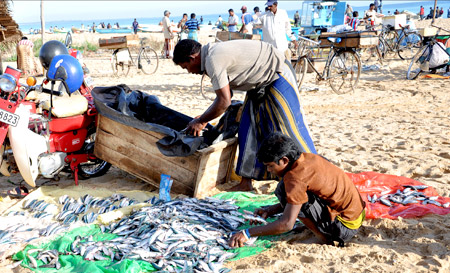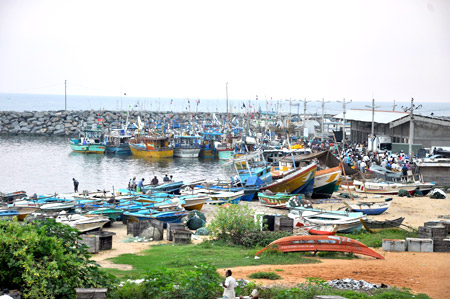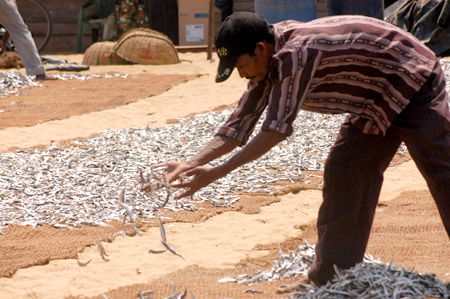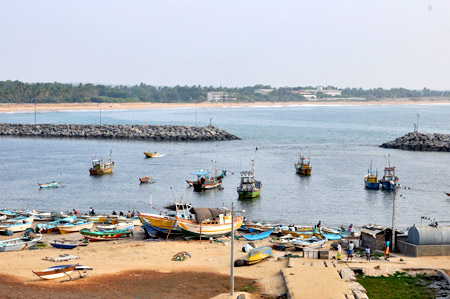Cultured farming ventures to uplift fisher families' lives
by P. Krishnaswamy
As a predominantly fisheries region,with thousands of fish species
and pearl-oysters in the Gulf of Mannar, the Mannar district was
thriving all along past history of the country, until terrorism raised
its ugly face three decades ago ravaging, mainly, the Northern and
Eastern provinces. During the height of the war on terrorism, the
government imposed a multitude of security measures, including sea
security zones and restrictions of fishing.
 While the fisher families of the Northern and Eastern provinces which
consisted of 60 percent of the island-nation's coastline were affected
immensely in all respects and were reduced to destitution, poachers from
across the Palk Strait took advantage of the situation and plundered the
marine resources of the Northern and Eastern Tamil fishermen.The
fishermen of the Mannar district had the worst impact because the
district is close to the Southern tip of India and the bay in between is
comparatively very narrow. While the fisher families of the Northern and Eastern provinces which
consisted of 60 percent of the island-nation's coastline were affected
immensely in all respects and were reduced to destitution, poachers from
across the Palk Strait took advantage of the situation and plundered the
marine resources of the Northern and Eastern Tamil fishermen.The
fishermen of the Mannar district had the worst impact because the
district is close to the Southern tip of India and the bay in between is
comparatively very narrow.
In 1980 fishing industry in the North accounted for 100,000 metric
tons. By 2009 that figure was a dismal 15,000 mt, according to fisheries
sources.
Programs
Since the eliminating of terrorism from the face of the country in
May 2009, the Government has made concerted efforts to restore the
industry in the North and East and the Ministry of Fisheries and Aquatic
Resources has implemented many far-reaching programs for the fishermen's
welfare. Infrastructure facilities and assistance such as fishing
vessels, other fishing gear, fuel subsidy and vessel monitoring system
have been provided by the Ministry. Pension schemes, insurance schemes
and compensation schemes have also been implemented by the Ministry ,
the resources said.
 Fishermen's representatives in Mannar told the Sunday Observer that
in spite of the Government's concerted efforts and all facilities, their
income from fishing is dwindling progressively due mainly to poaching,
harassments by the poachers and damages done to their fishing gear.
Fisher families find it difficult to have one square meal a day, under
the prevailing circumstances, they said. Until the situation improves,
they have no alternative but to think of other ways of eking out a
living and, under the advice and assistance from the Fisheries Ministry,
the National Aquaculture Development Authority of Sri Lanka (NAQDA) and
other authorities, their fishermen's unions are venturing into cultured
farming of prawns, sea bass, sea cucumber, ornamental fish, sea weed and
certain varieties of export-oriented fish, they said. Prawn culture
projects are also to be started, they said. Fishermen's representatives in Mannar told the Sunday Observer that
in spite of the Government's concerted efforts and all facilities, their
income from fishing is dwindling progressively due mainly to poaching,
harassments by the poachers and damages done to their fishing gear.
Fisher families find it difficult to have one square meal a day, under
the prevailing circumstances, they said. Until the situation improves,
they have no alternative but to think of other ways of eking out a
living and, under the advice and assistance from the Fisheries Ministry,
the National Aquaculture Development Authority of Sri Lanka (NAQDA) and
other authorities, their fishermen's unions are venturing into cultured
farming of prawns, sea bass, sea cucumber, ornamental fish, sea weed and
certain varieties of export-oriented fish, they said. Prawn culture
projects are also to be started, they said.
With investments from prospective investors and the support of the
government, these could be developed for the benefit of the fisher
families as well as the investors, they said.
President of the Federation of Mannar District Fishermen's
Associations, Justin Soysa, said that in the 80s the fishermen were able
to go into the sea four or even five km and they their marine resources
were free from poaching or any destructive methods of fishing. As a
result, they had a very good harvest.
 They built houses and bought jewellery and other household goods. They built houses and bought jewellery and other household goods.
The season was from October to May every year with no tidal waves or
strong winds. Their fishermen went fishing in the sea areas from
Talaimannar Pier to Mullikulam and Mannar to Mullikulam without any
hindrances, Soysa said. They prospered and contributed to the national
fish production as well. Although there were cordon and search
operations, those never affected the fishermen.
Damaged
Even after 1985 when the war on terrorism was intensifying, the
fishermen did not face any major problems. But after 1990 the situation
deteriorated and they could not even venture into the sea. While
poaching and destructive methods of bottom trawler fishing had
considerably damaged the coral gardens, which are fish breeding grounds,
the 2004 Boxing Day tsunami also destroyed coral gardens and uprooted
rocks at seabed which have contributed to the depletion of fish
resources, he said. The gas emitted from gas cylinders used for fishing
also have done considerable damage to the fish breeding process, Soysa
said.
 They have proposals to introduce the cultured farming system in
Devanpiddy, Pappamoddai, Mannar town areas and in the areas from
Thiruketheeswaram to Erukkalampiddy, Soysa said. They have proposals to introduce the cultured farming system in
Devanpiddy, Pappamoddai, Mannar town areas and in the areas from
Thiruketheeswaram to Erukkalampiddy, Soysa said.
Secretary of the Mannar District Fisheries Federation Abdhul Azeez
Rahim, President of the Pallimunai Fisheries Cooperative Society Sarath
Gerard Vithanage, Secretary of the Talaimannar Fishermen's Cooperative
Society Mohamed Shabir and Secretary of the Panangattikottai Cooperative
Society Gregory Anton Shankar who had expressed similar views with
regard to the plight of the fishermen expressed optimism that the
cultured farming ventures would help towards improving the living
standard of the fisher families. |

